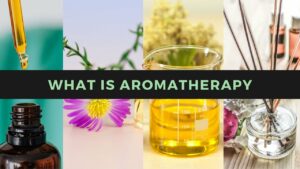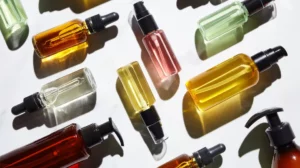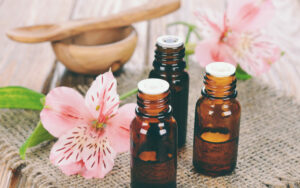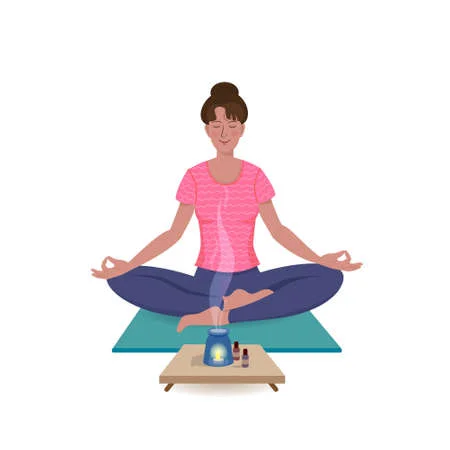Aromatherapy is a form of alternative medicine that uses essential oils to improve a person’s health or mood. Essential oils are natural extracts from plants, and each oil has its own unique set of benefits. In this blog post, we will discuss the use of aromatherapy for anxiety. We will look at how essential oils can help alleviate symptoms, and we will provide tips on how to use aromatherapy safely and effectively.
Contents
What Is Aromatherapy?
 From the name of it, we can figure out that aromatherapy consists of two words: “aroma” and “therapy.” Aroma, in this context, means a pleasant smell. Therapy, on the other hand, is a treatment meant to heal or soothe. So aromatherapy is basically using pleasant smells to make us feel better.
From the name of it, we can figure out that aromatherapy consists of two words: “aroma” and “therapy.” Aroma, in this context, means a pleasant smell. Therapy, on the other hand, is a treatment meant to heal or soothe. So aromatherapy is basically using pleasant smells to make us feel better.
Aromatherapy has been used for centuries to improve one’s mood and well-being. The practice likely originated in China or Egypt, and it was used as a way to freshen up homes and temples. Today, aromatherapy is still used for these purposes, but it is also used as a form of alternative medicine.
Aromatherapy is said to have a number of benefits for improving one’s emotional and mental health. While there is some scientific evidence to support these claims, more research is needed to confirm the efficacy of aromatherapy.
Despite any lack of scientific evidence, many people report feeling more relaxed and less anxious after using aromatherapy. It is an emerging field of study, and more research is needed to understand how essential oils work and what specific benefits they may have.
How Does Aromatherapy Help Anxiety?
Anxiety, as one might already know, is a mental disorder characterized by feelings of worry, stress, and fear. These feelings can be so intense that they interfere with a person’s daily life.
Aromatherapy is said to help anxiety in two ways: by reducing stress and by increasing relaxation. This can happen in various ways.
- Aromatherapy works by using the sense of smell to trigger physiological changes in the body. When you inhale an essential oil, the molecules travel through your nose and into your lungs. From there, they are absorbed into your bloodstream and circulated throughout your body.
- Once the molecules reach your brain, they can bind to receptors that influence mood, stress levels, and other emotions.
- The essential oils used in aromatherapy are also thought to interact with the limbic system, which is the part of the brain that controls emotions.
- Another theory suggests that aromatherapy works by stimulating the olfactory system, which is the part of the brain that is responsible for our sense of smell. When we inhale an essential oil, the molecules enter our nose and interact with cells in the olfactory system.
Either way, the ultimate goal of aromatherapy is to improve a person’s mood and well-being. It is thought to do this by reducing stress and promoting relaxation.
Types Of Oils Used
 There are a number of different essential oils that can be used for aromatherapy, and each oil has its own unique benefits. Some of the most popular essential oils for anxiety include the following.
There are a number of different essential oils that can be used for aromatherapy, and each oil has its own unique benefits. Some of the most popular essential oils for anxiety include the following.
- Lavender oil is one of the most popular essential oils for anxiety. It has a pleasant smell and is said to have calming and relaxation-inducing effects.
- Chamomile oil is another popular option for anxiety. Like lavender, it has a pleasant smell and is thought to be helpful for reducing stress and promoting relaxation.
- Ylang-ylang oil is another essential oil that is sometimes used for anxiety. It has a sweet, floral smell and is said to be helpful for relaxation.
- Bergamot oil is an essential oil that has a citrusy, refreshing smell. It is said to be helpful for uplifting mood and reducing stress.
- Sandalwood oil is an essential oil that has a woody, earthy smell. It is said to be helpful for relaxation and promoting feelings of well-being.
- Orange oil is one of the most popular essential oils for anxiety. It has a calming effect on the nervous system and can help to ease symptoms of anxiety and stress.
- Jasmine oil is another essential oil that can be used to help reduce anxiety and promote relaxation. This oil has a sweet, floral scent that can help to calm and soothe the mind.
- Lemon oil’s scent is said to be able to uplift your mood and relieve tension. This citrusy essential oil can also help improve concentration.
- Rosemary oil is another good choice for aromatherapy for anxiety. This oil is known for its ability to improve mental clarity and boost energy levels. Rosemary oil can also help to reduce stress and tension.
- Valerian root is another popular essential oil used for anxiety relief. This oil has a calming and sedative effect on the body, which can be helpful in reducing anxiety symptoms.
- Clary sage is an essential oil that is said to have a calming and sedative effect on the body. This oil can help to ease anxiety and promote relaxation.
- Patchouli is also used in aromatherapy for anxiety. This oil has a calming effect on the nervous system and can help to ease symptoms of anxiety and stress.
These are all possible options available when using aromatherapy for anxiety. You can experiment with any and all types to find the right fit for yourself.
What Other Issues Does Aromatherapy Help With?
Aromatherapy is not just limited to helping with anxiety. The practice can also be used to help with a number of other issues, such as:
- Depression
- Insomnia
- Stress
- Chronic pain
- Circulatory problems
- Muscle and/or joint pain
- Digestive issues
- Headaches
- Menstrual cramps
- Premenstrual syndrome (PMS)
The aromatherapy industry is a multi-billion dollar industry that is only growing. In fact, the global aromatherapy market is expected to reach $11.67 billion by 2025. This growth can be attributed to the increasing popularity of essential oils and the growing body of research supporting their efficacy.
Are There Any Drawbacks?
 Now that we know all of the wonderful benefits of aromatherapy, you might be wondering if there are any drawbacks. While essential oils are generally safe, there are a few things to keep in mind when using them.
Now that we know all of the wonderful benefits of aromatherapy, you might be wondering if there are any drawbacks. While essential oils are generally safe, there are a few things to keep in mind when using them.
- First, it’s important to remember that not all essential oils are created equal. Make sure to buy high-quality oils from a reputable source. Also, be sure to read the label carefully and follow the instructions.
- Second, it’s important to remember that essential oils are concentrated and should be used sparingly. When using them topically, be sure to dilute them with a carrier oil such as jojoba oil or coconut oil. And when using them aromatically, be sure not to overdo them. A little goes a long way!
- Moreover, aromatherapy does not contribute to helping the symptoms of anxiety. Rather, it is a form of complementary therapy that can be used in addition to other forms of treatment.
- It is also an apparent downside that the oils are not suitable for people with certain medical conditions, so always consult your physician first. Pregnant women and young children should also not use certain essential oils. It is also not advisable for people who have low blood pressure, are taking certain medications, or have epilepsy.
- Finally, keep in mind that essential oils are not regulated by the FDA. This means that there is no guarantee of their safety or efficacy. As always, it’s important to do your own research and consult with a qualified healthcare provider before using any new treatment.
It is important to keep these things in mind when using essential oils. However, overall, aromatherapy is a safe and effective way to reduce anxiety and promote relaxation.
How To Get Started?
 If you are thinking of trying aromatherapy for anxiety, there are a few things you should know before getting started.
If you are thinking of trying aromatherapy for anxiety, there are a few things you should know before getting started.
- First, it’s important to choose the right essential oils. You may think you can choose any, but not all oils are created equal. Some oils are more potent than others and can cause irritation if not used properly. Others may be less effective. It’s important to do your research and choose the right oil for you. Once you’ve done that, it’s time to get started!
- There are a few different ways to use essential oils for anxiety. The most common way is to use them aromatically, either through diffusing them or inhaling them directly from the bottle. You can also use them topically by diluting them with a carrier oil and applying them to your skin. Finally, you can take them internally by adding a few drops to a glass of water or taking them in capsules.
- If you are facing any confusion or complications, you can also approach an aromatherapist for help in starting out. They can help you choose the right oils and teach you how to use them properly.
Whichever way you choose to use them, essential oils can be a powerful tool in your anxiety-reduction arsenal. So don’t be afraid to give them a try!
Conclusion
Conclusively, if you’re looking for a natural way to ease anxiety symptoms, you may want to try aromatherapy. Aromatherapy is the use of essential oils from plants to promote relaxation and well-being. There are a variety of essential oils that can be used for anxiety. If you are thinking of trying it, be sure to do your research and consult with a qualified healthcare provider before getting started.
If you or someone you know is looking for psychological help, Therapy Mantra is here for you. We are the leading providers of online therapy and counseling. Our team of highly trained and experienced therapists can provide assistance at the most affordable rates. Contact us today to learn more about our services. You may also visit our website to book an online therapy session or download our free Android or iOS app for more information.


